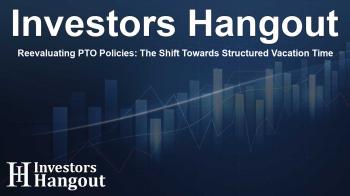Reevaluating PTO Policies: The Shift Towards Structured Vacation Time

Bolt's Departure from Unlimited PTO
Bolt, an innovative online checkout company, has taken a bold step by discontinuing its unlimited paid time off (PTO) policy, as announced by CEO Ryan Breslow. This decision places Bolt alongside major brands like Netflix and Kickstarter, known for similar policy reversals. Breslow has voiced concerns regarding the effectiveness of unlimited vacation, suggesting that it might not foster the supportive work environment that it originally promised.
The Reality of Unlimited Vacation
In Breslow's words, the concept of unlimited time off sounds appealing, yet it fails to deliver on its promises. "When time off is undefined, the good ones don’t take PTO. The bad ones take too much," he commented. This insight reflects a growing concern that unlimited vacation policies may inadvertently lead to burnout among high-performing employees while allowing less motivated staff to exploit the system.
Understanding the Impact of Policy Changes
As a result of this shift, Bolt is instituting a more structured vacation plan, mandating four weeks of paid vacation annually with additional time based on tenure. Breslow posits that this change encourages clarity and fairness in the workplace, which are essential for a productive environment where employees are expected to excel.
Lessons from Industry Trends
While Bolt has revised its PTO policy, experts suggest that the trend of implementing unlimited vacation often benefits companies more than their employees. Such policies can help firms reduce liabilities for unused vacation days, potentially leading to substantial savings.
According to insights from workplace specialists, organizations are estimated to collectively save upwards of $224 billion by adopting such policies. However, conscientious employees—often the backbone of any successful company—are less likely to utilize unlimited PTO, while those who are not as motivated may take advantage of the policy.
Shift Towards Efficient Management
Beyond PTO changes, Bolt is also redefining its operational framework by eliminating its traditional human resources department in favor of a more streamlined approach termed "people ops." This is intended to empower managers and improve efficiency across different teams, reducing the bureaucratic hurdles that can often slow down progress.
Ensuring Transparency and Fairness
With their new policies, Bolt aims to set a precedent within the tech industry that emphasizes the significance of clear and fair practices in addressing employee welfare. As companies navigate this challenging terrain, many are likely to rethink existing frameworks that govern time off and overall employee engagement.
Final Thoughts
The shift from unlimited PTO to scheduled vacation is indicative of a broader trend where businesses seek to establish clearer relational dynamics with their employees. In a rapidly changing work landscape, it’s critical to prioritize well-being while ensuring that performance expectations align with available resources.
Frequently Asked Questions
Why did Bolt eliminate its unlimited PTO policy?
Bolt terminated its unlimited PTO policy to address concerns about employee burnout and inefficiencies arising from undefined time off.
What will Bolt's new PTO policy entail?
The new policy introduces four mandatory weeks of paid vacation per year, with additional time based on employee tenure.
What are the benefits of structured PTO policies?
Structured PTO policies can improve clarity, promote fairness, and reduce employee burnout while enhancing overall productivity.
How do companies save money with unlimited vacation policies?
Unlimited vacation policies can decrease a company’s liability for unused days, potentially saving substantial amounts of money.
What is the shift towards 'people ops' at Bolt?
Bolt's shift towards 'people ops' aims to streamline operations and empower managers by minimizing bureaucratic processes inherent in traditional HR departments.
About The Author
Contact Addison Perry privately here. Or send an email with ATTN: Addison Perry as the subject to contact@investorshangout.com.
About Investors Hangout
Investors Hangout is a leading online stock forum for financial discussion and learning, offering a wide range of free tools and resources. It draws in traders of all levels, who exchange market knowledge, investigate trading tactics, and keep an eye on industry developments in real time. Featuring financial articles, stock message boards, quotes, charts, company profiles, and live news updates. Through cooperative learning and a wealth of informational resources, it helps users from novices creating their first portfolios to experts honing their techniques. Join Investors Hangout today: https://investorshangout.com/
The content of this article is based on factual, publicly available information and does not represent legal, financial, or investment advice. Investors Hangout does not offer financial advice, and the author is not a licensed financial advisor. Consult a qualified advisor before making any financial or investment decisions based on this article. This article should not be considered advice to purchase, sell, or hold any securities or other investments. If any of the material provided here is inaccurate, please contact us for corrections.

